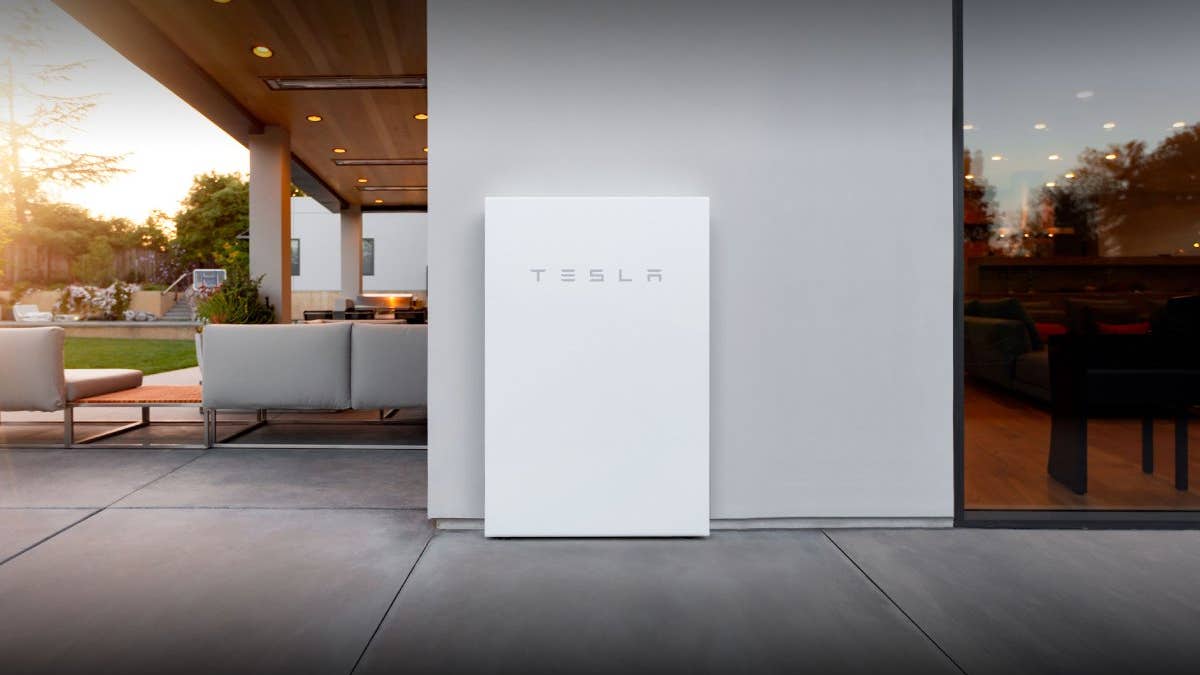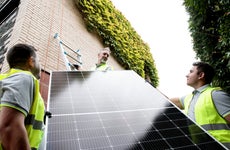Tesla Powerwall Cost

The Bankrate promise
At Bankrate we strive to help you make smarter financial decisions. While we adhere to strict , this post may contain references to products from our partners. Here's an explanation for .
Key takeaways
- The Tesla Powerwall costs $8,400 before other fees like installation and taxes.
- The total Powerwall price varies based on your location and installer.
- Tesla Powerwall alternatives are available but may cost more.
- Incentives and rebates offset the total cost to save you money.
How much is a Tesla Powerwall?
If you’ve explored solar for your home, chances are you’ve heard of the Tesla Powerwall. In 2023, one Tesla Powerwall costs $8,400 before taxes and additional fees. You can purchase directly from Tesla through the Powerwall Direct service or a third-party installer. The total cost may vary based on location, available incentives and the installation company you choose. If you buy more than one Tesla Powerwall at a time, you can save money on installation fees because they are installed at once instead of separately. The following is a breakdown of the Tesla Powerwall price for one unit.
- Powerwall: $7,300
- Gateway: $900
- Accessories: $200
- Installation labor: Varies
- Taxes: Varies
To determine the cost and serviceability for your home, input your address on Tesla’s website. If you buy two or three Powerwalls at the same time, the gateway and accessory fees stay the same, but each Powerwall battery costs $7,300. The Tesla Powerwall prices on this page reflect a cash purchase. The total cost may differ if you choose to finance with a loan. The Powerwall is the physical battery. The gateway manages grid connection and switches to backup power during an outage or if you want to go off-grid. Consider buying multiple Powerwall batteries to store enough power to fully back up your home or go off-grid. Tesla provides delivery and installation to your home through its Powerwall Direct service, but you will have to pay a hefty fee.
Interested in solar batteries?
SaveOnEnergy partners with Haven Energy to bring you options for solar batteries. Adding storage to your solar system can protect you from power outages or periods of lower production. We’ll work with you to determine how many batteries are best for your home.
Tesla Powerwall price vs. competitors
Solar batteries are expensive but worth the cost if you have frequent power outages, want to go off the grid or have a time-of-use energy plan. Installing a solar battery reduces electricity grid reliance and can lower your utility bill — an added benefit with the investment. According to the National Renewable Energy Laboratory (NREL), the average solar battery cost before installation and extra fees is $16,007. If you include installation, the NREL average price estimate is $18,791, over $10,000 more than the Tesla Powerwall. Understanding warranty terms, power capacity and potential added fees can help you compare the prices of solar batteries.
Compare the cost of a Tesla Powerwall with alternative battery storage solutions before incentives.
| Battery | Starting Cost |
| Tesla Powerwall 2 | $8,400 |
| LG 10H Prime | $6,000 |
| sonnenCore+ | $10,300 |
| Generac PWRcell | $10,000 |
| Electriq PowerPod2 | $15,000 |
Tesla Powerwall lifespan and warranty
Warranty terms and battery lifespan are important factors to consider when evaluating the cost of solar batteries. The Tesla Powerwall 2 and Powerwall+ warranty lasts 10 years, the industry standard. Your Powerwall may last more than 10 years, but its efficiency will gradually decline over time, just like a cell phone battery. Details of the Tesla Powerwall warranty include:
- Unlimited charge cycles: You can charge and use your battery as many times as you want during the 10-year warranted period.
- Quality of work warranty: A four-year warranty covering any issues caused by improper installation. If any replacement parts are needed, Tesla will ship them to you for free.
- End-of-warranty capacity clause: Your Powerwall is guaranteed to retain a minimum capacity of 70% by the end of its lifespan. This means that even after a decade of use, you can still rely on your Powerwall to deliver a significant amount of its original capacity.
Benefits of using a Tesla Powerwall
You can use a Tesla Powerwall with or without installing solar panels. If you do not have rooftop solar, the Powerwall stores energy from the electricity grid for you to use when you need it. The battery provides benefits for both scenarios, but the main advantage is grid resilience to ensure a continuous supply of electricity to your home. Having reliable backup power during an outage is valuable. You can keep the electricity running to essential devices and appliances, like a refrigerator, to prevent food from spoiling. Some other benefits of a Tesla Powerwall include:
- Time-of-use optimization: Maximize your time-of-use energy plan by storing extra electricity from the grid during off-peak hours. You can use the stored energy when rates are higher to help save money on your electricity bills.
- Energy management: The Tesla mobile app has many features to monitor your energy usage. Receive insights into how you consume electricity and make informed decisions to reduce your overall usage.
- Cost savings: Save on your energy bills by better understanding your energy consumption patterns. Use the insights in the Tesla mobile app to strategically store energy for later use during peak hours.
Solar battery incentives and rebates
Federal and local incentives can offset the cost of a battery storage system. Find additional incentives or rebates in your area by searching on your state and local government websites.
Residential Clean Energy Credit
The federal Residential Clean Energy Credit is one of the most significant solar incentives. You can apply for a 30 percent credit for your total solar battery cost on your next income tax return. Take advantage of the 30-percent federal tax credit to save on a Tesla Powerwall and claim the credit by filling out the IRS Form 5695. The Residential Clean Energy Credit will decrease to 26 percent in 2033, 22 percent in 2034 and set to expire in 2035. The credit was renewed in the past, but if you’re considering solar, take advantage of the maximum credit while you can.
If you’re seeking energy independence, energy bill savings or live in an area with an unreliable electricity grid, the Tesla Powerwall may be a good fit for you.
Related Articles



